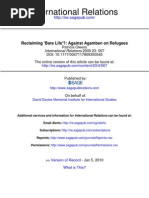Canguilhem The Normal And The Pathological Pdf Download
Posted By admin On 22/06/18
The Normal and the Pathological is one of the crucial contributions to the history of science in the last half century. It takes as its starting point the sudden appearance of biology as a science in the 19th-century and examines the conditions determining its particular makeup. Canguilhem analyzes the radically new way in which health and disease were defined in the early The Normal and the Pathological is one of the crucial contributions to the history of science in the last half century.
It takes as its starting point the sudden appearance of biology as a science in the 19th-century and examines the conditions determining its particular makeup. Canguilhem analyzes the radically new way in which health and disease were defined in the early 19th-century, showing that the emerging categories of the normal and the pathological were far from being objective scientific concepts. He demonstrates how the epistemological foundations of modern biology and medicine were intertwined with political, economic, and technological imperatives. Canguilhem was an important influence on the thought of Michel Foucault and Louis Althusser, in particular for the way in which he poses the problem of how new domains of knowledge come into being and how they are part of a discontinuous history of human thought. Can a book change your life? I read it at the high school on the advices of my professor of philosophy. At this time, I hesitated between medicine and philosophy.
The little red book. Canguilhem, resistant to the Nazi, physician and philosopher. In short a model, a hero.
Free PDF Download Books by Georges Canguilhem. Throughout The Normal and the Pathological Canguilhem emphasises continuities between social and biological.
He has given the aggregation of philosophy to Foucault. It was a completed time or France had great thinkers. Philosopher and physician, he made the synthesis in this work which takes again its thesis of 1943. Canguilhem fights po Can a book change your life? I read it at the high school on the advices of my professor of philosophy. At this time, I hesitated between medicine and philosophy. The little red book.
Canguilhem, resistant to the Nazi, physician and philosopher. In short a model, a hero. He has given the aggregation of philosophy to Foucault. It was a completed time or France had great thinkers.
Philosopher and physician, he made the synthesis in this work which takes again its thesis of 1943. Canguilhem fights positivism very present in medicine as in Claude Bernard for example. Constitutional Law Of India By J N Pandey Pdf File on this page. Download Jarte.
For him, the pathological status is defined like a quantitative variation compared to the normality. For Canguilhem, the disease is perceived qualitatively by the patient. Pathological status must be defined both quanttatively and qualiatively. Questioning on the concept of normality, he gives the patient to the center of the medical approach: “The physician must take account of the individual and subjective dimension of the disease, the conscience and the feeling of the patient “ That appears normal and obvious to you but it was very new. Thank you Georges. Drivers Permit Test In Florida on this page.
A very important book, profound, but occasionally difficult to get through. Canguilhem, for his renown as a philosopher, originally trained as a physician and wrote his thesis, which forms the first section of this volume, at the completion of his medical doctorate from the University of Strasbourg. Point being, there are long passages of medical detail that are impenetrable and uninteresting to someone coming at this from a philosophical or history of science angle.
What is most interesting is A very important book, profound, but occasionally difficult to get through. Canguilhem, for his renown as a philosopher, originally trained as a physician and wrote his thesis, which forms the first section of this volume, at the completion of his medical doctorate from the University of Strasbourg. Point being, there are long passages of medical detail that are impenetrable and uninteresting to someone coming at this from a philosophical or history of science angle. What is most interesting is the assault on the perception of life sciences, the investigation of how they are framed and frame themselves, teasing their conclusions into various threads - the normal, norms, normativity, error, health, disease, physiology - and using this analysis to challenge the self-conception.
Biological sciences, far from being statistical / rigorous / neutral, are woven from politically / economically / technologically / culturally / religiously influenced interpretations of 'fact'. Beyond his writing, Canguilhem was incredibly influential in the second half of the 20th century in France through his institutional positions as Inspector General and, later, President of the Jury d'Agregation in Philosophy. His impact on thinkers such as Derrida, Althusser, Lacan, and particularly Foucault, are easy to trace and to 'feel.' As Foucault writes in his introduction, '[.:] it is easy to find the place of those who, from near or from afar, had been trained by Canguilhem.' Trace back to his antecedent, and you find Bachelard. A fine set of poles to connect.